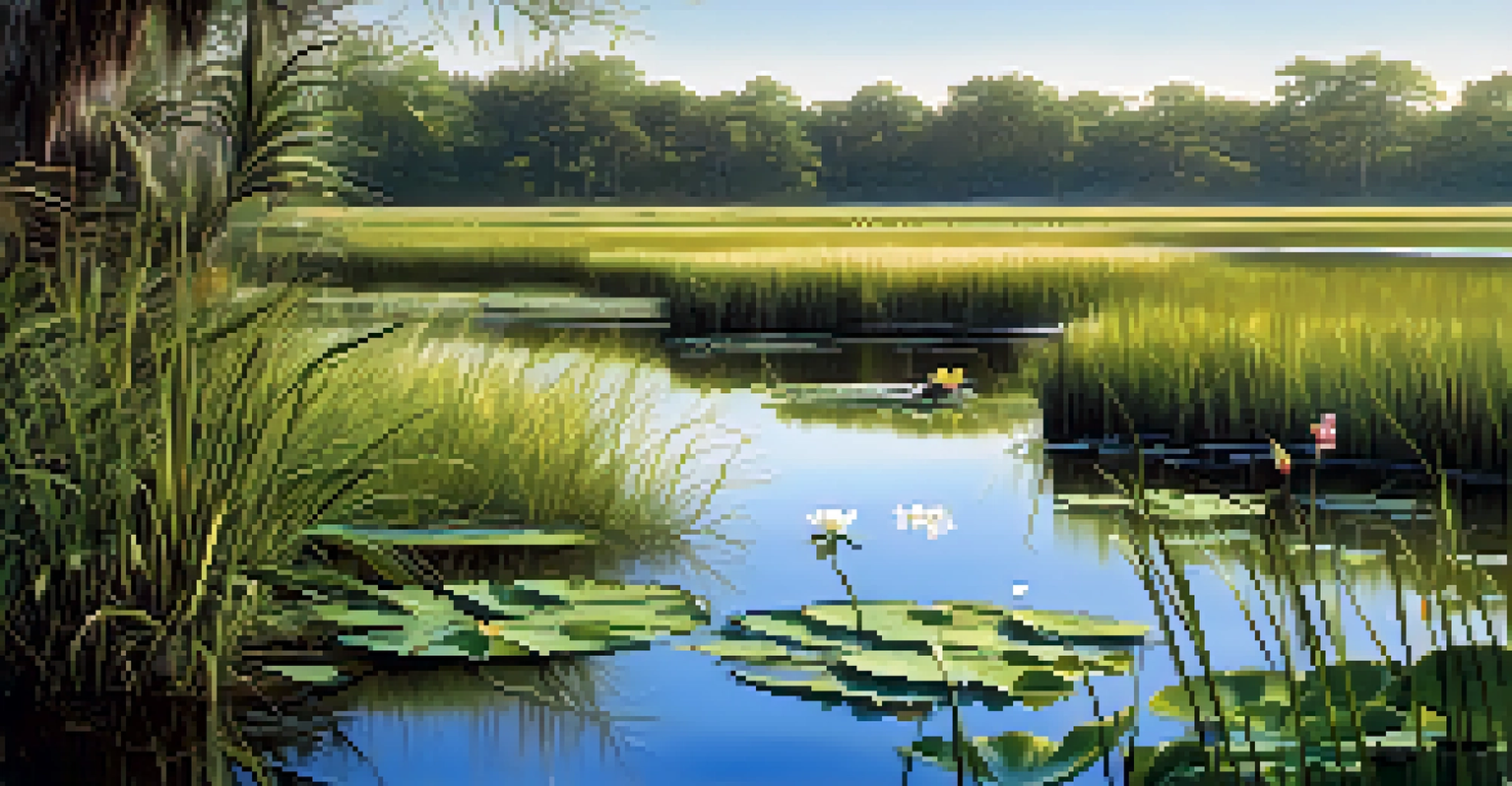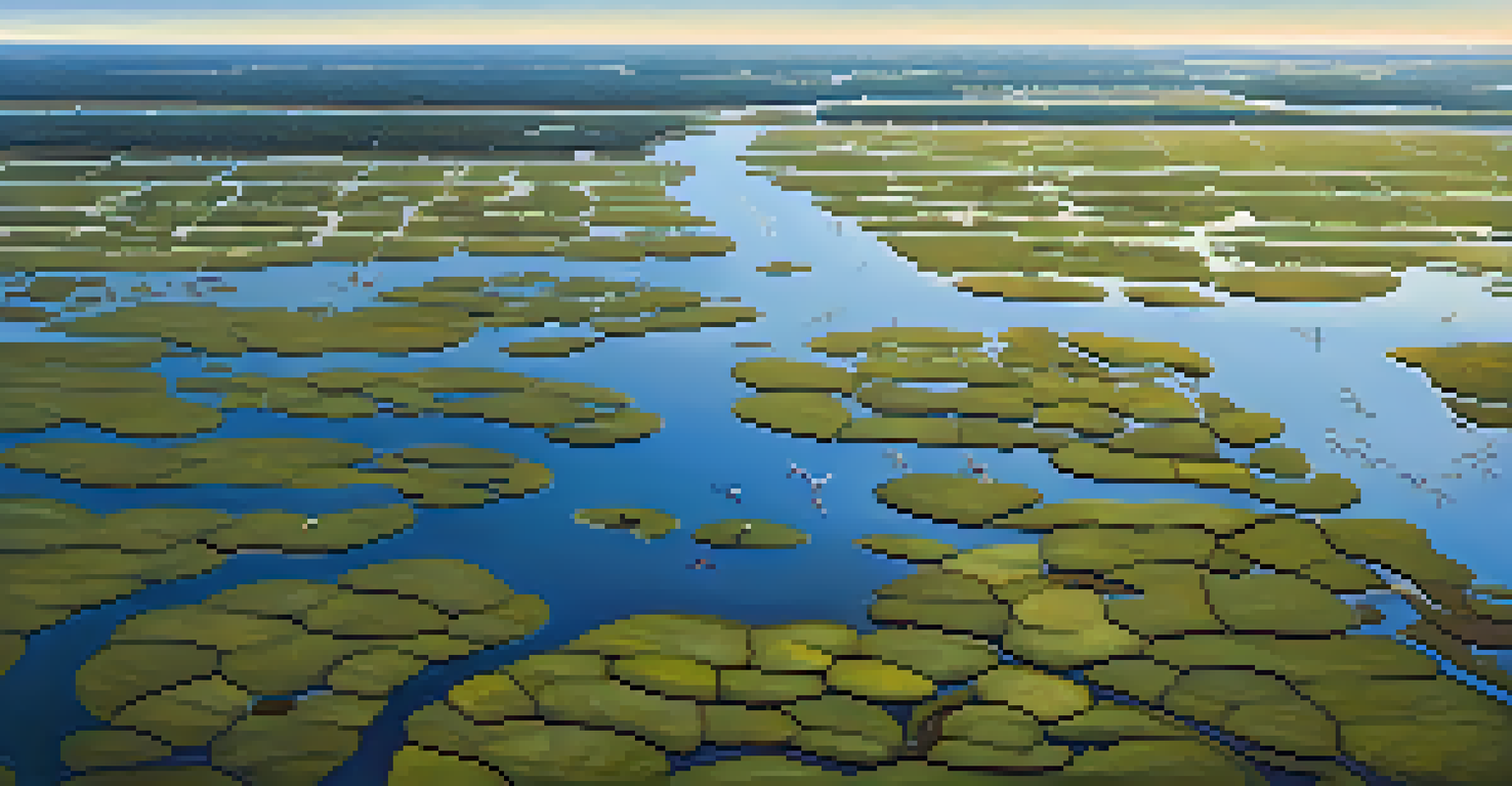The Importance of Louisiana's Marshes for Wildlife Survival

Louisiana's Marshes: An Ecosystem Overview
Louisiana's marshes are a unique ecosystem, formed by the convergence of river and ocean waters. These wetlands serve as a critical buffer between land and sea, absorbing excess water during storms and providing a habitat for countless species. They are not just beautiful landscapes; they play a vital role in maintaining ecological balance and supporting wildlife.
Wetlands are among the most productive ecosystems on the planet, providing essential services to both wildlife and humans.
The marshes are teeming with life, acting as nurseries for fish, shrimp, and crabs, which are essential for the fishing industry. In fact, many species of birds, mammals, and reptiles rely on these wetlands for food and shelter. As such, Louisiana's marshes are a cornerstone of both local and national biodiversity.
However, these ecosystems are under threat from climate change, pollution, and human activities. Understanding their importance is the first step toward protecting them and ensuring that wildlife continues to thrive.
Wildlife Habitats: A Diverse Home
The marshes of Louisiana serve as homes for a variety of wildlife, including alligators, otters, and numerous bird species. Migratory birds, such as herons and egrets, flock to these wetlands during their seasonal travels, making the marshes a crucial stopover. This diversity of species showcases the marshes' role as a sanctuary for both resident and migratory wildlife.

In addition to providing shelter, the marshes offer abundant food sources, such as insects, plants, and fish. This rich food web supports not only smaller animals but also larger predators, creating a balanced ecosystem. Ultimately, the interconnected relationships within these habitats highlight the marshes' importance in sustaining wildlife populations.
Marshes: Essential Wildlife Habitat
Louisiana's marshes provide critical habitats for diverse wildlife, supporting both resident and migratory species.
Preserving these habitats is essential for maintaining this biodiversity. Unfortunately, habitat loss due to development and erosion threatens the very existence of these marshes and the wildlife that depends on them.
The Role of Marshes in Flood Control
One of the lesser-known benefits of Louisiana's marshes is their ability to mitigate flooding. The dense vegetation and soil structure absorb excess rainwater and storm surges, reducing the risk of flooding in nearby communities. This natural barrier not only protects human lives but also safeguards wildlife habitats from inundation.
In every walk with nature, one receives far more than he seeks.
When storms hit, marshes act like sponges, soaking up water and slowly releasing it back into the environment. This process helps maintain the water balance in the ecosystem, benefiting both flora and fauna. Without these wetlands, the impact of severe weather events would be far more devastating.
As climate change brings more intense storms, the preservation of marshlands becomes even more critical. Investing in these natural flood defenses can save lives and protect wildlife, making it a win-win for both people and nature.
Threats to Louisiana's Marsh Ecosystems
Despite their importance, Louisiana's marshes face several threats, including climate change, rising sea levels, and industrial encroachment. These factors lead to erosion, habitat loss, and pollution, all of which compromise the health of the marsh ecosystem. The delicate balance that supports wildlife is increasingly at risk.
Pollution from agriculture and industry can contaminate water sources, affecting the plants and animals that call the marshes home. Additionally, the construction of levees and canals disrupts natural water flow, leading to further degradation of these vital habitats. Without action, the future of Louisiana's marshes and their wildlife remains uncertain.
Marshes Mitigate Flood Risks
The dense vegetation of Louisiana's marshes helps absorb excess water, reducing flood risks for nearby communities.
Addressing these threats requires collective efforts from communities, policymakers, and conservationists. By raising awareness and implementing sustainable practices, we can protect these ecosystems for future generations.
Conservation Efforts: Protecting the Marshes
Various organizations and local governments are dedicated to the conservation of Louisiana's marshes. Initiatives such as habitat restoration, pollution control, and sustainable land use practices aim to rehabilitate these vital ecosystems. These efforts not only benefit wildlife but also enhance the overall health of the environment.
Community involvement is also crucial in conservation efforts. Local residents can participate in clean-up drives, educational programs, and advocacy campaigns to promote the importance of marsh preservation. When communities take ownership of their natural resources, the chances for successful conservation increase significantly.
Ultimately, effective conservation requires collaboration among various stakeholders, including government agencies, non-profits, and citizens. Together, we can create a sustainable future for Louisiana's marshes and the wildlife that depend on them.
The Economic Value of Louisiana's Marshes
Beyond their ecological significance, Louisiana's marshes also hold substantial economic value. They support industries such as fishing, tourism, and recreational activities, providing livelihoods for many local families. The fishing industry, in particular, relies heavily on healthy marsh ecosystems for a bountiful catch.
Tourism related to the natural beauty and biodiversity of the marshes attracts visitors from around the world. Eco-tourism opportunities, such as bird watching and kayaking, not only generate revenue but also raise awareness about the importance of preserving these ecosystems. By highlighting the economic benefits, we can motivate more people to get involved in conservation efforts.
Conservation is Crucial for Marshes
Collective efforts in conservation are essential to protect Louisiana's marshes from threats like climate change and pollution.
Investing in the health of marshes is not just an environmental imperative; it is also an economic one. A thriving marsh ecosystem can lead to a sustainable local economy, benefiting both wildlife and communities.
The Future of Louisiana's Marshes: A Call to Action
The future of Louisiana's marshes and the wildlife that inhabit them hangs in the balance. As climate change and human activities continue to threaten these vital ecosystems, it is crucial to take action now. By understanding their significance, we can advocate for policies and practices that prioritize marsh conservation.
Each of us has a role to play, whether it's supporting local conservation organizations, participating in community initiatives, or simply spreading the word about the importance of these ecosystems. Educating ourselves and others about the value of marshes can foster a deeper appreciation and drive change.

Now is the time to act. Together, we can ensure that Louisiana's marshes remain vibrant ecosystems that support wildlife and enrich our lives for generations to come.